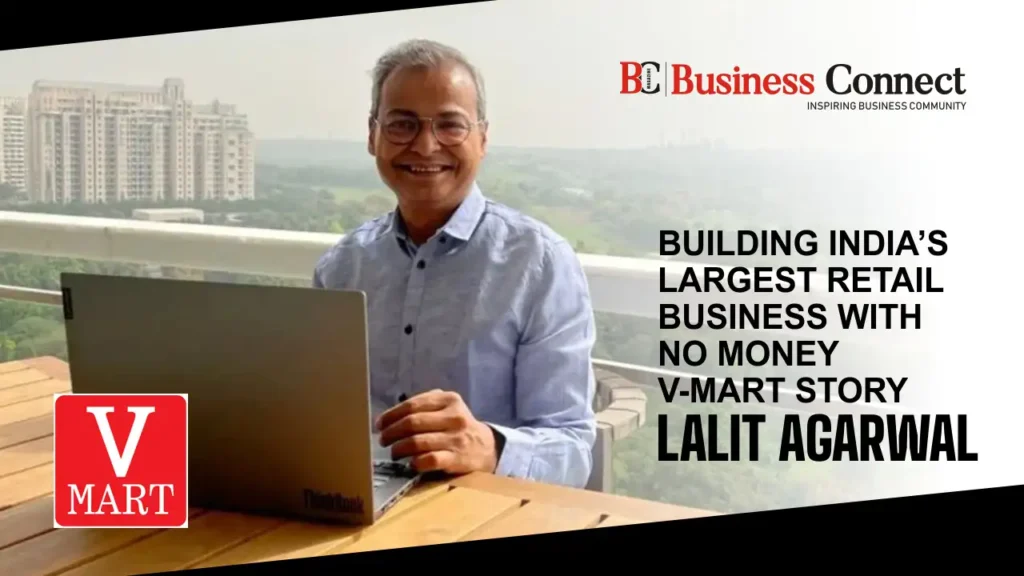Building India’s largest Retail Business With no Money | v-mart story | Lalit Agarwal
V-Mart Shopping has become such a fixture of Indian inexpensive shopping that it’s difficult to realize it was founded in 2003. That year, Chairman and Managing Director Lalit Agarwal opened the first V-Mart store, and the firm went public in 2013. It now has over 180 stores in 149 sites throughout 14 states, and it has made investor value accretion a key component of its business.
Lalit was among the first in India to pioneer the concept of cheap retail chains, co-founding the first of its kind with partners before launching V-Mart as his own retail venture.
What is V-Mart?
V-Mart Retail Ltd is an Indian retailer that provides ready-to-wear apparel, accessories, and other merchandise. It is in the ‘Value Retailing’ business. The company’s retail stores are operated under the V-Mart name.
Who is Lalit Agarwal?
Lalit Agarwal is a retail entrepreneur who founded V-Mart in 2002, pioneering the notion of organised value retailing in Tier II, III, and IV Indian cities with a concentration on low-cost clothing.
About V-Mart Retail Ltd
V-Mart Retail Ltd. began operations in 2002. V-Mart is a full-service family retail store that sells men’s, women’s, and children’s apparel, shoes, and accessories. The company also sells home furnishings, general merchandise toys, crockery, cutlery and other home utility products. V-Mart Retail was awarded the world’s highest-performing department store in 2018, according to Bloomberg data. The Government of India’s Ministry of Textiles awarded the business the Transforming India Through Retail award in 2019 for ‘Transforming lives in Tier II and III cities.
Lalit Agarwal V-Mart Journey.
He started his own business under the brand name “V-Mart” and opened the first lifestyle shop in Ahmedabad in 2003, with the goal of promoting the concept of organised value shopping in some underserved areas of India. This company was dubbed Western India’s First Organized LifeStyle Retail Store for the Middle and Lower Segments. V-mart today has 136 stores in 116 sites in 14 states and union territories, with a total retail area of 11.48 million square feet. Under his guidance, a team of 16000 people works directly or indirectly for the corporation.
Drivers of change
Lalit’s success in identifying a market demand for an aspirational shop that offers high clothes and accessories as well as fast-moving consumer products and grocery essentials at affordable prices was a major driver of this rapid ascent. Instead of the most populous cities in India, the intention was to develop freestanding stores in Tier II and Tier III cities, as well as smaller villages.
Lalit had studied Commerce and Financial Management but more importantly, he had hands-on experience with demographics. I grew up in a little place, he says. I was aware of those towns’ market capabilities and what their clients need. I reasoned that there must be many comparable locations in India. There was a lot of organised shopping in major areas but little in small towns to meet people’s expectations.
According to Lalit, V-Mart offers a unique shopping experience for people in small towns. People in small towns want to look well and wear the latest fashion, and even if they don’t have much money, they watch the same television channels and have the same dreams as everyone else.
The Acquisition
While the pandemic affected the whole retail industry, value-chain retailers like V-Mart and others saw a momentary stop, which they swiftly overcame owing to pent-up demand and pivot techniques and technology integration into the brand’s operations.
V-Mart announced the purchase of Unlimited from Arvind Lifestyle Brands Ltd in order to extend its footprint in the south and west Indian markets. According to a formal agreement signed by the two sides, ALBL’s value-fashion retail chain Unlimited would be sold to V-Mart Retail Ltd for an estimated Rs 150 crore in an all-cash deal. Unlimited has stores across South and West India, selling men’s, women’s, and children’s trendy clothing and accessories.
Growth amidst challenges
Despite having a fantastic business idea, Lalit recalls that the company’s early days were challenging. At first, it was quite difficult. We were short on financial supplies and a team. But in the years afterwards, we’ve built a culture in which everyone trusts and can rely on one another.
V-Mart implemented enterprise resource planning and refined its business strategy and the public embraced its stores, particularly the clothing sector which became the company’s primary income stream. V-Mart Retail had 30 stores by 2008, allowing it to raise its first round of private equity funding and grow further. It became public five years later allowing it to establish dozens of additional stores and dramatically extend its distribution network. Lalit believes there is still space for growth and the company has identified over 5,000 towns throughout India that are the ideal size and demographics for a V-Mart location.
The Tech Push
V-basket Mart’s size expanded by 8% in the fourth quarter of FY21, and the discount retailer hopes to sustain this pace via the use of technology and digital enhancements.
Through our online channel, we have access to very rich data that we are analyzing to better understand consumer expectations. Our repeat customers have increased our revenue by 65-70 per cent. We are providing incentives and shopping coupons to encourage this growth. We’re also increasing our product offering by bringing a home décor category and FMCG goods to our site, which will be available both offline and online. Despite city-wide restrictions and lockdown restrictions, our overall business surged by 90% in July last year.



